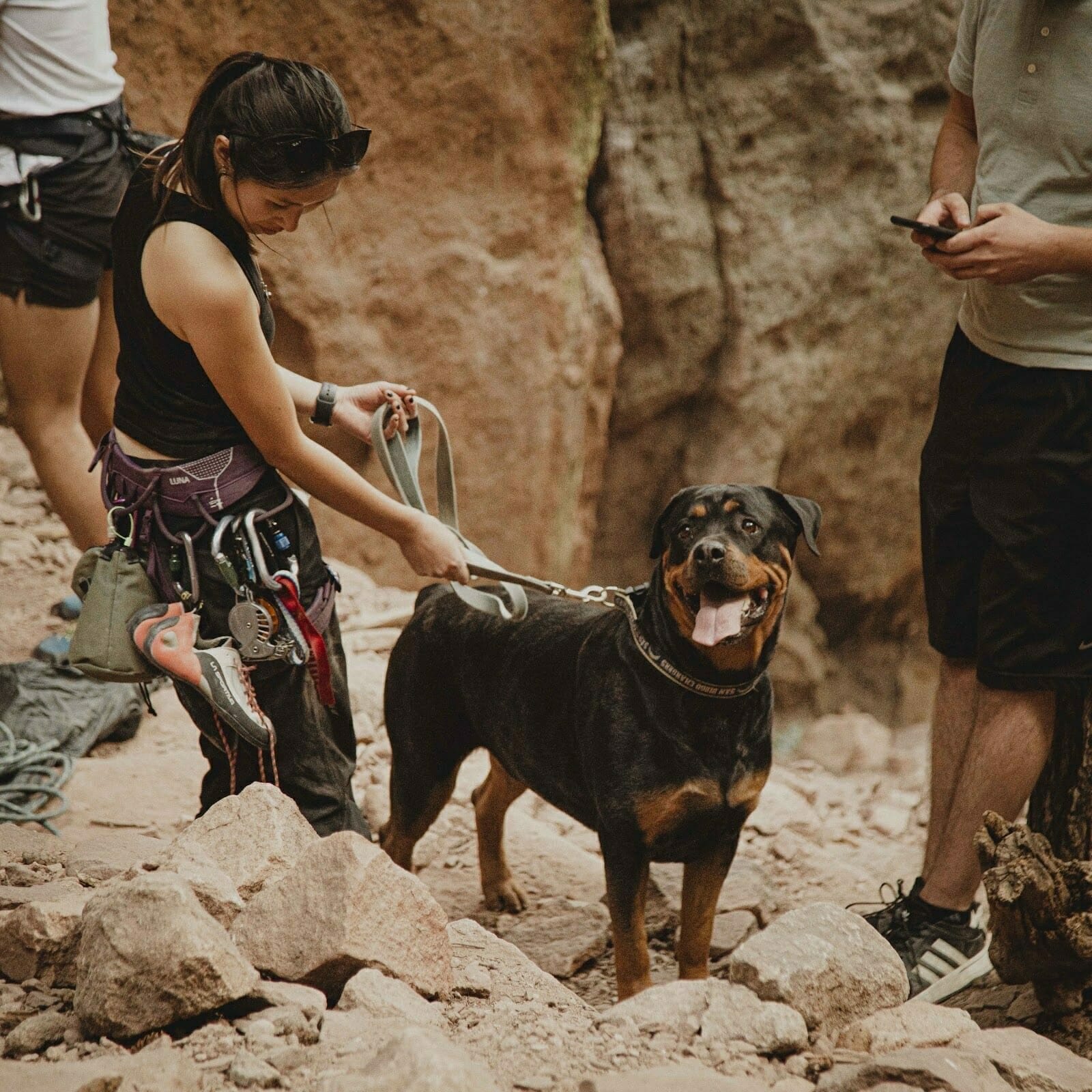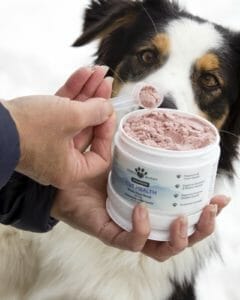9 Signs of Poor Gut Health in Dogs
January 17, 2023
Written By: Earth Buddy Team

Understanding the signs of poor gut health in dogs is an essential component for overall wellness and longevity. The gastrointestinal tract is the body’s most important immune system, so it makes sense that its condition impacts overall pet health. The GI tract plays a role in food digestion, nutrient absorption, waste elimination, and immunity. If your dog’s gut isn’t working properly, the rest of their body won’t be either.
Poor gut health is often caused by dysbiosis. Dysbiosis is a decline in bacterial diversity and an increase in inflammatory response with bacterial species. Leaky gut, decreased immunity, and deficiencies in micronutrients are all consequences of an unbalanced gut microbiome. The most common signs of poor gut health in dogs, or dysbiosis, include the following:
#1: Skin and Coat
If your dog’s coat is dull and lifeless, it may be time to check their gut health. Your dog’s coat is an extension of their skin, and just as people can develop skin problems, dogs can have skin issues too.
The condition most likely to cause a dull coat in dogs is a diet low in fats and proteins. Fats are needed by the body to maintain healthy skin and fur. If you’re feeding your dog a diet that only contains carbohydrates and no animal protein or fat, their coat could become dull and lifeless.
A healthy diet for your dog should include protein from animal sources such as meat, poultry, eggs, and/or fish. These foods improve gut health and provide essential fatty acids to enhance skin and coat.
Variety is also important to maintain proper gut health. Variety is important because different foods contain different nutrients. If you feed your dog the same thing every day, they may not receive all the nutrients they need to remain healthy. Whereas, if you offer a diet full of variety, what isn’t found in one food will be found in another, filling in any nutritional gaps and maintaining good gut health.
#2: Vomiting
Dogs that vomit more frequently than normal may have poor gut health. Knowing the cause of your dog’s vomiting is important so you can get them the right treatment.
Vomiting is a sign that something is wrong with your dog’s digestive system. If your dog vomits once or twice and seems to recover, it’s probably nothing to worry about and you can ignore it. But if your dog vomits frequently, or their vomit becomes greenish or contains blood, contact your veterinarian immediately.
#3: Diarrhea

It’s important to note that diarrhea can actually be caused by something as simple as a change in diet, so it’s important to rule out other causes before assuming your dog has GI issues. Additional causes may also include food poisoning, infection, and inflammatory bowel syndrome.
#4: Flatulence
Foul gas is a sign of dysbiosis. Dysbiosis means that the good and bad bacteria in your dog’s gut are out of balance. This can cause many digestive issues, including the release of foul-smelling gas. Dogs who have a lot of intestinal gasses aren’t necessarily unhealthy—it’s just a byproduct of poor digestion due to an imbalance in pH levels. However, if you notice foul-smelling gas from your dog on a regular basis, it may be time to consider addressing their digestive health with probiotic bacteria or dietary changes.
The best way to avoid this problem is by feeding your dog foods that promote healthy digestion and prevent dysbiosis, such as bone broth, and avoiding foods that may contribute to it like high-glycemic carbohydrates like potatoes or grains like corn husks, which contain roughage that can irritate their stomach lining, causing an upset stomach and discomfort while eating.
#5: Constipation
A dog who is constipated has trouble passing stool. This can be caused by a number of factors, including dehydration, and a lack of fiber in the diet. Stress and medications have also been known to cause constipation.
Signs of constipation include lethargy, loss of appetite, and vomiting or diarrhea. If your dog shows any of these symptoms for more than 24 hours, contact your veterinarian and explain what you’re observing.
#6: Bad Breath
Halitosis, or bad breath, is one of the most common signs of poor gut health. If you notice your dog has bad breath, it’s important to first rule out other causes. In addition to dysbiosis, bad breath can be caused by poor dental hygiene, mouth infections, or an unhealthy diet.
#7: Food Allergies or Intolerances
The bacteria in the gut can produce a varying inflammatory response signals. Dogs with a healthy gut have a balance of these bacteria. However, when the gut isn’t balanced, this could lead to higher inflammatory response levels, leading to food intolerances. Undigested micronutrients may be seen by the immune system as allergens, leading to poor skin and coat health.
Determining if your dog has food allergies is difficult because the signs can vary greatly from dog to dog. Many dog owners do not realize that their puppies or adult dogs have food allergies until they switch foods.
Food-related allergies can affect any breed of dog at any age; however, some breeds seem more susceptible than others. If your dog has had problems with chronic skin issues such as itching and scratching but you have been unable to pinpoint what is causing them, it may be time for you to look into testing for food-based allergies.
#8: Impaired Immune System

#9: Impaired Mood
The gut is a major hub of immune activity, and the immune system plays a key role in mood. When the gut microbiome is out of balance, it can not only influence our dog’s digestive tract but their mental health as well. Think about when you’re eating junk food versus when you’re eating healthy foods. If you eat fast food everyday, even if you don’t notice, it could affect your mood. Your gut is likely not balanced if you’re making poor food choices. However, if you have been on a specialized food regimen, you likely noticed how much better you feel both physically and mentally. It’s similar to our dogs.
Testing for Dysbiosis
Your vet can test for dysbiosis by collecting samples from your dog’s stool and sending them to a lab for analysis. If your vet finds that your dog has dysbiosis, you’ll likely need to provide your dog with special probiotic supplements containing beneficial bacteria that will help restore balance in their gut.
A fecal transplant may also be recommended, depending on the severity of your dog’s gut health. Fecal transplants are performed using stool from healthy dogs (those with a healthy gut) that is mixed with saline or water and then administered orally or through an enema to restore your dog’s gut health. Fecal matter contains billions of beneficial bacteria that help maintain good digestive health in pets.
The stool from a healthy dog is infused into your dog’s colon via an enema or endoscopy. This process can help restore gut health.
Understanding the Signs of Poor Gut Health in Dogs
As you can see, the signs of poor gut health in dogs can be mistaken for a number of other ailments. However, a healthy gut is key to a healthy dog. If you notice any of the above signs in your dog, talk to your veterinarian and make an appointment for testing to be performed, if necessary. There are also gut health tests available, like those from AnimalBiome, that can examine your dog’s gut health.
If any signs appear to be severe, bring your dog to the emergency veterinarian immediately. Although most of these signs seem relatively minor, they could become serious. Diarrhea, for example, can lead to dehydration quickly.
Here is a recent video our co-founder, Sean, did with Dr. Katie Woodley covering many of the topics in this blog:
For further reading, we recommend:
- https://www.mdpi.com/2306-7381/7/3/92
- https://bmcvetres.biomedcentral.com/articles/10.1186/s12917-021-02815-y
- https://www.frontiersin.org/articles/10.3389/fneur.2021.721126/full
- https://www.ncbi.nlm.nih.gov/pmc/articles/PMC4657189/
- https://onlinelibrary.wiley.com/doi/abs/10.1111/j.1748-5827.1987.tb01328.x?systemMessage=Wiley+Online+Library+will+be+disrupted+9+July+from+10-12+BST+for+monthly+maintenance
- https://microbiomejournal.biomedcentral.com/articles/10.1186/s40168-018-0450-3
- https://www.ncbi.nlm.nih.gov/pmc/articles/PMC9413255/
You Might Also Enjoy
Your dog’s skin is their largest organ making dog skin care a crucial part of…
Like us, our dogs, and other mammalian species, cats have an endocannabinoid system. This system…
Learning how to calm a dog down is an essential skill to have in your…



